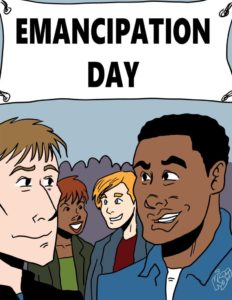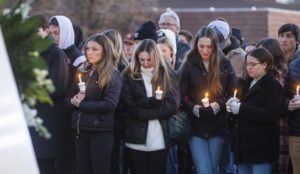There is arguably no artist hotter and more recognizable in music right now than Megan Thee Stallion. With less than two years in the industry, the 25-year-old Houston native has five top 10 singles, has gone platinum three times and has collaborated with both Beyoncé and Cardi B. When it comes to young, talented Black women, Megan Thee Stallion is among the very best.
Yet when she was shot on July 12 in Los Angeles in an incident allegedly involving another rapper, no one believed her. Instead, she was a punchline for the next couple of weeks, to the point where she felt compelled to document on Instagram her scar from the surgery to have the bullet removed.
That sparked a rally of support within the music and entertainment industry, built around a phrase that, while not new, is gaining unparalleled traction. You may have heard it following the rape and murder of Oluwatoyin Salau, a young Nigerian American activist, in June. Or when activists tried to draw national attention to their efforts to get justice for Breonna Taylor, who was shot dead by police officers in her home in Louisville, Kentucky, in March. Alongside #BlackLivesMatter and #AbolishThePolice, #ProtectBlackWomen is a fast-growing movement.https://platform.twitter.com/embed/index.html?creatorScreenName=ozy&dnt=true&embedId=twitter-widget-0&frame=false&hideCard=false&hideThread=false&id=1296935970948800513&lang=en&origin=https%3A%2F%2Fwww.ozy.com%2Fnews-and-politics%2Fthe-cry-to-protect-black-women-is-growing-louder%2F374165%2F&siteScreenName=ozy&theme=light&widgetsVersion=223fc1c4%3A1596143124634&width=500px
“There are more calls for the protection of Black women of late,” says Chanda Daniels, a digital communications expert in Washington, D.C., and co-founder of the Reclaim, a civic organization that creates spaces where women can feel included and heard. Until now, Daniels says, there has been a disparity in the level of action and outrage following violence against Black women and that of Black men. “There is finally a power shift — and Black women are being heard finally, and louder than ever before,” she says.
This disparity was on display in Dave Chappelle’s 8:46 special, in which he covered the current racial climate and civilian casualties yet failed to mention women altogether. But what does it really mean when Black women call for protection? It’s obvious in cases like Megan Thee Stallion’s and Salau’s but less so in others.
https://platform.twitter.com/embed/index.html?creatorScreenName=ozy&dnt=true&embedId=twitter-widget-1&frame=false&hideCard=false&hideThread=false&id=1287958943218593793&lang=en&origin=https%3A%2F%2Fwww.ozy.com%2Fnews-and-politics%2Fthe-cry-to-protect-black-women-is-growing-louder%2F374165%2F&siteScreenName=ozy&theme=light&widgetsVersion=223fc1c4%3A1596143124634&width=500px
Take a look at the workplace, for instance. Black women outpace African American men almost 2-to-1 in earning college or associate degrees. Yet Black women have a higher unemployment rate than Black men. They’re also more likely to work in low-paying service and retail jobs. The discrimination continues at the hospital, where Black women’s maternal mortality rate is 2.5 times higher than that of white women.
THEY ARE CALLING FOR BLACK MEN TO JOIN THEM IN ACKNOWLEDGING AND CHALLENGING VIOLENCE THEY ARE EXPERIENCING.
ARIELLA ROTRAMEL, CONNECTICUT COLLEGE
Ariella Rotramel, an associate professor in gender, sexuality, and intersectionality studies at Connecticut College, says the call to protect Black women isn’t about women wanting men to protect them in a literal, patriarchal sense. Instead, she says, it’s about emphasizing that political activism and conversations about the community need to include Black women — cisgender and transgender — and genderqueer people.
“They [Black women] are calling for Black men to join them in acknowledging and challenging violence they are experiencing,” explains Rotramel. “Otherwise, the energy of the community and allies tends to focus on Black men and ignore the issues Black women are facing.”
This support can come in different ways — including by voting for Black women who are increasingly emerging as some of the community’s boldest leaders, whether it’s the Black female mayors of Atlanta, Chicago and New Orleans or Democratic vice presidential nominee Kamala Harris.
Not everyone feels this is entirely new. Jameta N. Barlow, a community health psychologist and member of the American Psychological Association’s committee on women in psychology who has researched Black women and mental health, says, “Black men have traditionally and historically stood up, showed up and protected women.”
Take Malcolm X’s famous speech in Los Angeles in 1962. “The most disrespected person in America is the Black woman. The most unprotected person in America is the Black woman. The most neglected person in America is the Black woman,” he said. https://www.youtube.com/embed/6EIEKe8fVmg?feature=oembed
That was almost 60 years ago, yet the message has made its way back to the forefront of public attention with greater simplicity: Protect Black women. Even Barlow agrees that what we’re witnessing today is different from years past. “Given the politics of COVID-19 and current national politics, emotions are heightened and folks are more engaged in ongoing issues related to Black women’s health,” she says.
Whether the plea is new, old or amplified, Megan Thee Stallion’s experience is a stark reminder that even one of the most famous Black women today doesn’t feel safe. The hashtag #ProtectBlackWomen is just the start.




